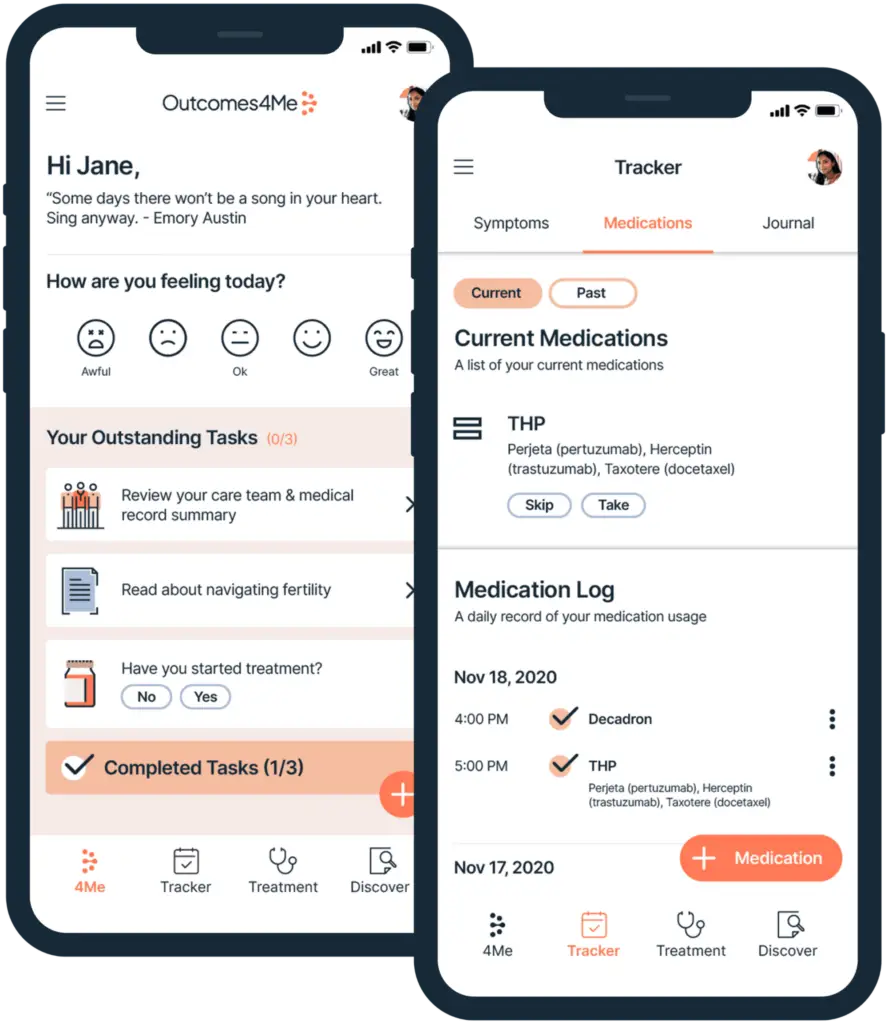CDK 4/6 inhibitors have received a lot of attention in the past few weeks for their role in treating early-stage breast cancer. On March 3, 2023, the FDA expanded the indication for use of Verzenio in a broader patient population, and on March 27, 2023 Novartis announced positive topline first results from its phase III Natalee trial. The trial, which studied the use of Kisqali in treating women and men with stage 2 and 3 early breast cancer, found that Kisqali combined with endocrine therapy significantly reduced the risk of disease recurrence compared to endocrine therapy alone. This news is very exciting for additional treatment options in early-stage hormone receptor-positive, HER2- early breast cancer and you likely have questions about what this might mean for your treatment plan.
We hope the following information helps you feel more informed about this treatment option so you can have a productive conversation with your medical team to determine if it might be a right fit for you.
On a personal note, I just wrapped up three years of taking Kisqali on the Natalee trial and am so thankful that the initial data looks so promising. I found the trial through the Outcomes4Me app and am so grateful I had the opportunity to participate in this important research. If you have questions about CDK 4/6 inhibitors or would like help exploring clinical trials with an oncology nurse practitioner don’t hesitate to use the Ask Now button in the app to connect with one on our team!
Suzanne Garner
Director, Community
Outcomes4Me
What are CDK 4/6 inhibitors?
CDK 4/6 inhibitors are an important advancement in the treatment of hormone receptor-positive breast cancer. By targeting proteins involved in the cell cycle, these drugs can help slow or stop the growth of cancer cells and improve the effectiveness of hormone therapy.
Hormone receptor-positive breast cancer is a type of breast cancer that is fueled by hormones, such as estrogen and progesterone. Hormone therapy, which blocks or reduces the effects of these hormones, is often used to treat this type of breast cancer. However, some tumors can become resistant to hormone therapy over time, which can limit the effectiveness of that therapy. CDK 4/6 inhibitors have been shown to be particularly effective when combined with hormone therapy in treating hormone receptor-positive breast cancer.
To understand how CDK 4/6 inhibitors work, it’s important to first understand a bit about how cells grow and divide. Our body’s cells have a natural process of growing, dividing, and dying in a controlled manner. This process is regulated by various proteins, including a group of proteins called cyclin-dependent kinases (CDKs). CDKs help control the cell cycle and ensure that cells only divide when they’re supposed to. By targeting the cell cycle and interrupting the growth of cancer cells, CDK 4/6 inhibitors can help overcome resistance to hormone therapy and make it more effective.
History of CDK 4/6 inhibitors
This combination of treatments has been shown to improve outcomes for patients with metastatic hormone receptor-positive breast cancer, including longer periods of time without the cancer growing or spreading and has been an important therapy in advanced breast cancer treatment since 2015 when the first of the three CDK 4/6 inhibitors, Ibrance, was FDA approved for use in this patient population.
Due to the success of CDK 4/6 inhibitors in treating patients with metastatic breast cancer, three trials testing the safety and efficacy of Ibrance, Verzenio, and Kisqali in early-stage breast cancer have been conducted. As a result, Verzenio is now FDA-approved for use in early-stage hormone-positive breast cancer and as we mentioned Kisqali may not be far behind! Unfortunately, Ibrance did not show a benefit in this early-stage patient population.
At Outcomes4Me, we’re overcome with gratitude for all of the women and men living with metastatic breast cancer that have made the choice to participate in a clinical trial. Participation in these clinical trials has not only helped to validate the efficacy and safety of CDK 4/6 inhibitors but also paved the way for the approval of these groundbreaking drugs in the treatment of hormone receptor-positive, HER2-negative early breast cancer. Their contributions have made a significant difference in the lives of countless individuals affected by breast cancer, both now and in the future.
Conducting trials in patients with metastatic cancer is often the first step toward potential approval in the early-stage patient population. There are many reasons why but to summarize it is considered more ethically justifiable due to the higher risk-to-benefit ratio. Patients with advanced disease have fewer treatment options, and the potential benefits of a new therapy may outweigh the potential risks, making it more acceptable to test new treatments in this population. Metastatic cancer progresses more rapidly, so the effects of new treatments can be observed and measured more quickly in clinical trials. This enables researchers to assess the efficacy and safety of new therapies in a relatively shorter period of time, which helps to accelerate the development of promising treatments.
By choosing to participate in these trials, these women and men have given hope to countless patients, their families, and the entire medical community, as we continue our shared pursuit of more effective treatment options and, ultimately, a cure for breast cancer. Their selfless decision to take part in these clinical trials has enabled great strides in our understanding of breast cancer and its treatment, and for that, we are truly grateful. To these patients: please know that your bravery and dedication will never be forgotten.





